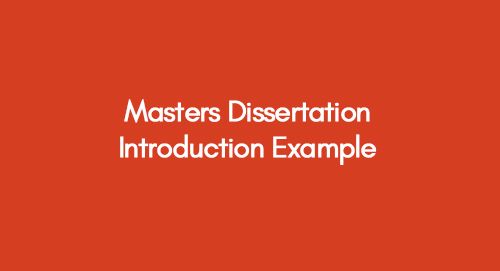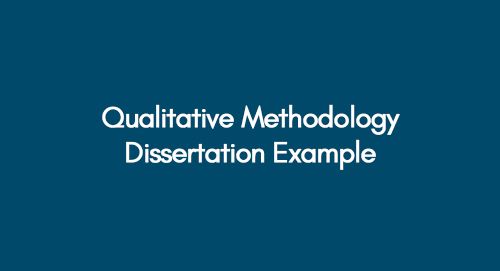
Masters Dissertation Introduction Example
February 24, 2023Topics form with Ad
February 28, 2023Research methodology is essential in a dissertation as it provides a systematic and structured approach to conducting research, gathering data, analyzing it, and drawing conclusions.
Understanding research methodology is key for any student studying or conducting research. This article will dive into the ins and outs of research methodology, including what a qualitative research methodology dissertation entails.
These successfully crafted qualitative methodology dissertation examples will assist you in understanding how to compose your dissertation using data collected through the qualitative methodology. Make sure to check them out.
Example: 1 Importance of Procurement Strategy & Impact on Construction Projects
Example: 2 Investigating Cyberbullying and Its impact on Adolescents
The methods you utilized for data gathering and analysis are covered and explained in your research methodology. The methodology chapter, a crucial component of any dissertation, thesis, or research paper, describes what you did and how you did it. It enables readers to assess the validity and dependability of your research and dissertation subject.
It should contain the following:
- The kind of research you carried out
- How you gathered and process your data
- Any apparatus or materials you utilized throughout the research
- How you reduced or avoided bias in research
- Why were these approaches adopted
What is Research Methodology?
Research methodology refers to the systematic approach or techniques used to conduct research, gather data, analyze it, and draw conclusions. It involves selecting appropriate research design, methods, tools, and techniques to answer research questions or investigate a particular phenomenon. The research methodology can be broadly categorized into two types:
- Quantitative research methodology
- Qualitative research methodology
1. Quantitative Research Methodology
Quantitative research methodology is a scientific approach used to collect and analyze numerical data to answer research questions or test hypotheses.
It involves using structured surveys, experiments, or other standardized measures to obtain objective and measurable data. This methodology aims to produce precise and generalizable results that can be replicated and compared across different contexts.
Researchers often use statistical techniques to analyze the data collected in quantitative research, allowing them to draw conclusions and make predictions based on the data.
To get a detailed description and guide on quantitative research methodology, check out the link given below:
2. Qualitative Research Methodology
Qualitative research methodology is used to explore complex phenomena and experiences. It involves collecting data from participants naturally, usually through interviews, observations, and focus group discussions. The data collected is descriptive and non-numerical, allowing researchers to explore the depth and richness of the phenomenon under study.
You can review the following qualitative methodology dissertation example to learn how to ace your qualitative data dissertation.
You can download the dissertation pdf of qualitative methodology dissertation example from the link.
Importance of Research Methodology in Dissertation
Here are the key reasons why research methodology is important in a dissertation:
a. Enhances the Validity and Reliability of the Study
The research methodology, which offers a defined procedure for gathering and analyzing data, assures the validity and dependability of the study. It aids in reducing prejudice and mistakes that may compromise the reliability and correctness of the study findings.
b. Ensures Rigor in the Study
Ensures that the study is rigorous by providing a clear and systematic approach to research. It helps to ensure that the research is conducted in a thorough, complete, and rigorous way, thus providing credible evidence to support the research findings.
c. Provides a Clear Research Plan
Research design, data collection approaches, data analysis methodologies, and research processes are all included in the research methodology, which offers a defined study strategy. It ensures that the research is carried out in an organized and structured manner, lowering the possibility of uncertainty and mistakes.
d. Helps to Address Research Questions
Research methodology provides a framework for addressing research questions by providing a clear and structured approach to data collection and analysis. That simplifies the process of ensuring that the research is centred on answering the research questions and giving succinct, unambiguous replies to the queries.
e. Allows for Replication
It assures that the research can be replicated, demonstrating the validity and reliability of the research findings. It's crucial for scientific research since it enables other researchers to validate the findings and further the development of new information.
How To Explain Your Methodological Approach?
You might begin by outlining your general research approach. Here, you have two choices.
Initiate with your "what."
- What research question or problem did you look into?
- Attempt to summarize the features of something?
- Investigate a subject that needs to receive more attention.
- Establish a causal connection.
- And what kind of data did you need to accomplish this goal?
- Data that is quantitative, qualitative, or a combination of both?
- Was the research conducted through primary data your effort?
- Did you receive assistance from somewhile while collecting secondary data?
- Descriptive data obtained by observations or experimental data obtained through the control and manipulation of variables?
Identify your "why."
- Depending on your subject, you could also begin by going over your method's justification and underlying assumptions. In other words, why did you pick these research methods?
- Why is this the most effective strategy for addressing your research question?
- Is this the accepted practice in your profession, or does it need to be justified?
- Does your decision-making entail any ethical considerations?
- What standards of validity and reliability apply to this kind of research? How did you stop bias from skewing your results?
Detailed Guide on Qualitative Research Methodology Dissertation
i. Choose a Research Topic: Select a research topic that interests you and aligns with your research aims and objectives.
ii. Conduct a Literature Review: Review existing literature to identify research gaps, theoretical frameworks, and related studies. It will help you develop your research questions and hypotheses.
To have detailed literature review assistance, skim through this link:
Structuring Literature Reviews: A Guide on How to Structure a Literature Review for Success
iii. Select a Research Design: Choose a research design that aligns with your research aims and objectives. Common qualitative research designs include case studies, ethnography, grounded theory, and phenomenology.
iv. Select Data Collection Methods: Choose data collection methods that align with your research design and research questions. Common data collection methods in qualitative research include interviews, observations, and focus group discussions.
v. Select Participants: Select participants that align with your research aims and objectives. Use purposive sampling techniques such as snowball sampling or convenience sampling to recruit participants.
vi. Collect Data: Collect data using the selected data collection methods. Ensure that you obtain informed consent from participants and maintain confidentiality and anonymity throughout the data collection process.
vii. Analyze Data: Analyze the data using a suitable qualitative data analysis technique such as thematic analysis, content or discourse analysis. That will help you identify patterns, themes, and insights from the data.
viii. Interpret Findings: Interpret the findings and draw conclusions that align with your research aims and objectives. Use quotes and examples from the data to support your findings.
ix. Write the Dissertation: Write the dissertation following the standard structure of a dissertation, including an introduction, literature review, research design and methodology, data analysis, results, discussion, and conclusion.
x. Review and Revise: Review and revise your dissertation to ensure it is coherent, well-written, and free from errors.
Conclusion
In conclusion, understanding what qualitative research methodology is essential for any student engaging in academic studies or conducting their own independent study/research project/dissertation involving gathering first-hand information from participants through various means such as interviews, focus groups etc.
An effective qualitative dissertation should include clearly defined objectives, use appropriate theoretical frameworks, employ rigorous sampling techniques & collect high-quality data while employing systematic analysis & draw meaningful conclusions & presenting results effectively while addressing questions raised by stakeholders throughout the process.
Get an Immediate Response
Discuss your custom requirements with our writers
Free Online Plagiarism Checker For Students
We will email you the report within 24 hours.
Upload your file for free plagiarism



























